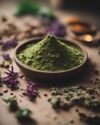
Ayurveda is one of the world's oldest systems of medicine. In Sanskrit, ayur means "life," and veda means "knowledge;" so it means "knowledge of life." It was developed over 6,000 years ago in India and is still widely practiced all over the world. The main principle behind Ayurveda is that the mind and body are inextricably connected. Ayurveda promotes good health through balancing the body, mind, and spirit as a preventative to having to fight diseases through medicine and treatment.
Ayurveda is based on the premise that we consist of three governing elements of nature - vata (air), pitta (fire), and kapha (earth). Everyone is a unique combination of these elements or doshas, containing different proportions of each. The combination dictates our eating habits, sleeping habits, and overall way of living life. Symptoms of mental and physical illness are signals that one or more of the doshas is not in balance.
1. "Healthy" means something different to everyone
We all know the fundamental rules of eating healthy-stick to natural clean foods. Simple, right? So why is there so much debate over diets? Ketogenic, paleo, Whole30, Mediterranean, low-carb, raw, vegan, dairy-free - the options for healthy eating are overwhelming these days. The debate is probably because everyone responds to foods and diets differently, something that Ayurveda discovered thousands of years ago.
If you're working on becoming healthier, eat what's best for your body, knowing that something different might work for someone else. Ayurveda tells you to eat according to your dosha, or which of your doshas is imbalanced - warm heavy foods balance vata; cool refreshing foods balance pitta; and lightly cooked or raw foods balance kapha.
2. Use six tastes in every meal
This story is from the August 2023 edition of Heartfulness eMagazine.
Start your 7-day Magzter GOLD free trial to access thousands of curated premium stories, and 9,000+ magazines and newspapers.
Already a subscriber ? Sign In
This story is from the August 2023 edition of Heartfulness eMagazine.
Start your 7-day Magzter GOLD free trial to access thousands of curated premium stories, and 9,000+ magazines and newspapers.
Already a subscriber? Sign In

A Flower from THE HEAVENS
November 14 is Children's Day. This year, SARA BUBBER brings to you a world of forests, magical flowers, festivals, and some animals you may have never seen.

Meeting Phenomenal Women
The author, CHITRA BANERJEE DIVAKARUNI, is interviewed here by TARA KHANDELWAL and MICHELLE D'COSTA about her books on mythology, like The Palace of Illusions, which is a retelling of the Mahabharata from Draupadi's point of view, and The Forest of Enchantments, which is a retelling of the Ramayana, from the eyes of Sita. And there's The Last Queen, which is about Rani Jindan's life.

HERBAL TOOTH POWDERS: Rediscovering Ayurveda's Natural Secrets
SRAVAN BANDA presents a natural herbal tooth powder, offering a holistic approach to oral hygiene, harnessing the power of medicinal herbs.

The Dance of Light and Shadow Lessons from the Dolomites
ALAIN DESVIGNE explores the Dolomites, listed as a UNESCO World Heritage Site in 2009.

FINDING OUR WAY
A Polynesian Explorer's Journey of Discovery

The First Imprint: Understanding PTSD
CHRISTIANNA DEICHMANN is the Director of Education at the Association for Pre and Perinatal Psychology and Health (APPPAH), where she educates both professionals and parents on fostering the most nurturing environments for welcoming new life into the world.

The Tipping Point
In this final conversation of the series, J. FREDERICK ARMENT continues to talk with CHRISTINE JONES about promoting peace in the world.

UNLOCK YOUR POTENTIAL
Take The Brighter Minds Path To Cognitive Development

The Intrinsic Goodness of the Heart
DAAJI shares some thoughts on heartfelt acceptance and all it has to offer. He says, \"It is the heart's intrinsic goodness that allows us to accept everything as part of us.

How Does Fear Affect Our Roles as Mothers? - Neelam Shivhare explores some of the great ancient texts of India on motherhood, compares the behavior of Kaikayi and Yashoda
Neelam Shivhare explores some of the great ancient texts of India on motherhood, compares the behavior of Kaikayi and Yashoda, and realizes the importance of removing fear from our hearts in order to nurture our children.For young women like myself, who are future mothers, I trust we are on the path of becoming selfaware and brutally honest with ourselves. We are creative beings, never forgetting the gifts with which we have been bestowed— the love and tenderness, natural instincts, and intuition to feel the right path. It all lies in the mysterious meanderings of the heart. Are we really listening to our hearts, or confusing the bombarding information on social media with reality?